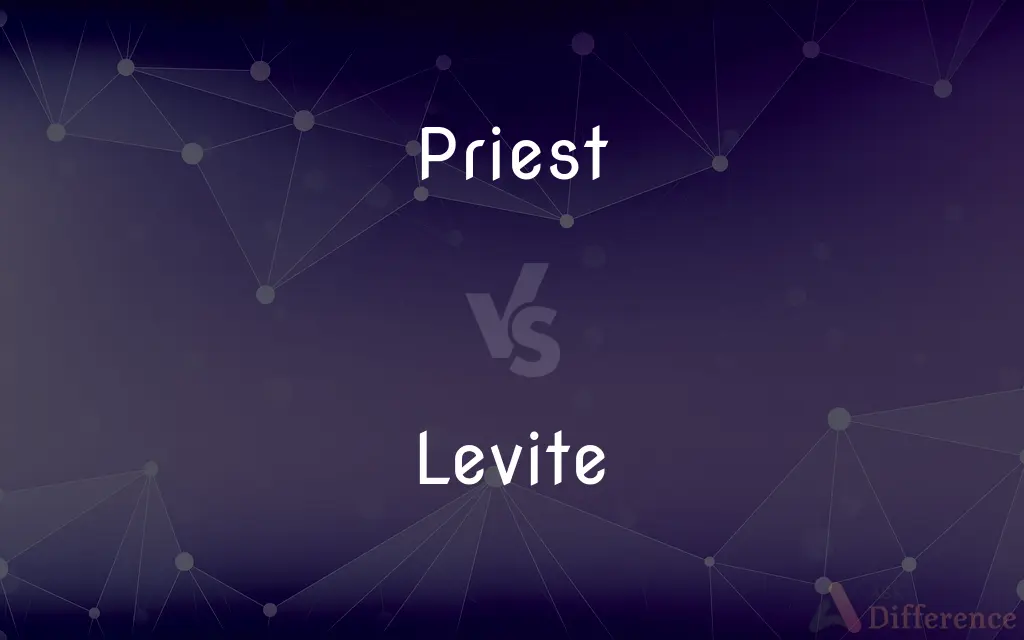Priest vs. Levite — What's the Difference?
By Maham Liaqat & Fiza Rafique — Updated on March 20, 2024
A Priest, in various religions, serves as a mediator between the divine and humans, performing rituals and offering sacrifices. A Levite, specifically in Judaism, belongs to the tribe of Levi, assisting priests in the Temple with non-sacrificial duties.

Difference Between Priest and Levite
Table of Contents
ADVERTISEMENT
Key Differences
Priests across different religions hold a central role in conducting worship, performing rituals, and offering sacrifices to deities or God. In contrast, Levites, within the context of Judaism, originate from the tribe of Levi, one of the twelve tribes of Israel.
The distinction between Priests and Levites is particularly evident in the rituals and responsibilities assigned to each within the Jewish Temple. Priests were directly involved in the sacrificial system, performing offerings and rituals essential to the religious worship of the time. Levites, although not authorized to perform these sacrifices, played a crucial role in the spiritual and cultural life of the people, ensuring the smooth operation of the Temple's services.
In terms of hierarchy and religious authority, priests generally occupy a higher status due to their direct involvement in sacred rituals and communication with the divine. Levites, while holding a respected position within the Jewish community for their service, do not perform the core religious functions reserved for the priests but instead focus on the practical and educational aspects of religious practice.
Educational and social roles also differentiate Priests and Levites. Priests often assume leadership positions within their communities, providing spiritual guidance, counseling, and interpretation of religious laws and ethics. Levites, especially in historical contexts, were also educators and musicians, contributing to the community's moral and spiritual education through teaching and the arts.
Although the primary context for understanding Priests and Levites is within Judaism, the concept of a priest extends to many other religions, showcasing the universal role of religious intermediaries who facilitate worship and spiritual communication. The Levites' role, however, is unique to Judaism, emphasizing the particular historical and religious narrative of the Jewish people and their covenant with God.
ADVERTISEMENT
Comparison Chart
Definition
A religious leader performing rituals and sacrifices, mediating between the divine and humans.
A member of the tribe of Levi, assisting priests in the Temple with non-sacrificial duties.
Origin
Various religions worldwide.
Specific to Judaism, from the tribe of Levi.
Duties
Conducting worship, offering sacrifices, providing spiritual guidance.
Supporting temple functions, teaching, and maintaining the sanctuary.
Authority & Status
High religious authority, direct communication with the divine.
Respected for their service, but without the authority to perform sacrifices.
Community Role
Spiritual leaders, counselors, interpreters of sacred texts.
Educators, musicians, guardians of the Temple's sanctity.
Religious Context
Universal across many religions.
Unique to Judaism.
Educational Role
Often responsible for religious education and moral guidance.
Focused on teaching Torah and participating in religious music.
Compare with Definitions
Priest
Spiritual leaders providing guidance and interpreting sacred laws.
Priests counsel individuals on moral and ethical issues.
Levite
Teachers of the Torah and religious practices.
Levites had the role of educating the community in the laws of the Torah.
Priest
Responsible for the administration of sacraments.
Priests baptize individuals, marking their entry into the Christian faith.
Levite
Non-priestly roles within the Jewish religious hierarchy.
Levites carried the Ark of the Covenant during relocation.
Priest
Mediators between God and humans, conducting religious rituals.
Catholic priests celebrate Mass, offering the Eucharist.
Levite
Members of the Levi tribe assisting in Temple duties.
Levites were responsible for the music and singing during Temple services.
Priest
Holders of religious authority and community respect.
Priests often play a key role in community events and decisions.
Levite
Participants in the maintenance and operation of the Temple.
Levites were involved in cleaning and preparing the Temple.
Priest
Performers of sacrificial rites and ceremonies.
In ancient religions, priests made offerings to gods for the community's welfare.
Levite
Historical guardians of religious tradition and practice.
Levites preserved and passed down religious songs and teachings.
Priest
A priest is a religious leader authorized to perform the sacred rituals of a religion, especially as a mediatory agent between humans and one or more deities. They also have the authority or power to administer religious rites; in particular, rites of sacrifice to, and propitiation of, a deity or deities.
Levite
A Levite (or Levi) (, Hebrew: לֵוִי, Modern: Levi, Tiberian: Lēwî) is a Jewish male who claims patrilineal descent from the Tribe of Levi. The Tribe of Levi descended from Levi, the third son of Jacob and Leah.
Priest
An ordained minister of the Catholic, Orthodox, or Anglican Church, authorized to perform certain rites and administer certain sacraments
The priest celebrated mass at a small altar off the north transept
Levite
A member of the lineage of Jews who were of the tribe of Levi but not descended from Aaron, and whose men historically served as assistants to the Temple priests.
Priest
Ordain to the priesthood
He was made deacon in 1990 and priested in 1994
Levite
One of the tribe or family of Levi; a descendant of Levi; esp., one subordinate to the priests (who were of the same tribe) and employed in various duties connected with the tabernacle first, and afterward the temple, such as the care of the building, bringing of wood and other necessaries for the sacrifices, the music of the services, etc.
Priest
In many Christian churches, a member of the second grade of clergy ranking below a bishop but above a deacon and having authority to administer the sacraments.
Levite
A priest; - so called in contempt or ridicule.
Priest
A person having the authority to perform and administer religious rites.
Levite
A member of the Hebrew tribe of Levi (especially the branch that provided male assistants to the Temple priests)
Priest
To ordain or admit to the priesthood.
Priest
A religious clergyman (clergywoman, clergyperson) who is trained to perform services or sacrifices at a church or temple
The priest at the Catholic church heard his confession.
The Shinto priest burnt incense for his ancestors.
The Israelite priests were descended from Moses' brother Aaron.
Priest
(Mormonism) the highest office in the Aaronic priesthood
Priest
(transitive) To ordain as a priest.
Priest
A presbyter elder; a minister
Priest
One who officiates at the altar, or performs the rites of sacrifice; one who acts as a mediator between men and the divinity or the gods in any form of religion; as, Buddhist priests.
Then the priest of Jupiter . . . brought oxen and garlands . . . and would have done sacrifice with the people.
Every priest taken from among men is ordained for men in things pertaining to God, that he may offer both gifts and sacrifices for sins.
Priest
To ordain as priest.
Priest
A clergyman in Christian churches who has the authority to perform or administer various religious rites; one of the Holy Orders
Priest
A spiritual leader in a non-Christian religion
Common Curiosities
What is the primary role of a Priest?
The primary role of a Priest is to serve as a mediator between the divine and the congregation, performing religious rituals and sacrifices.
Who are the Levites?
Levites are members of the tribe of Levi in Judaism, tasked with assisting the priests in the Temple and performing various non-sacrificial duties.
Can Levites perform the duties of a Priest?
No, Levites cannot perform the sacrificial duties of Priests, as those roles are specifically reserved for Priests, particularly those descended from Aaron.
What is the significance of the tribe of Levi in Judaism?
The tribe of Levi holds a special status in Judaism for their role in the Temple, serving God and the community through their designated religious functions.
Why can't Levites offer sacrifices?
Levites cannot offer sacrifices because this role is exclusively performed by Priests, who have the authority and lineage to conduct these sacred rituals.
How do Priests and Levites differ in their duties?
Priests are directly involved in performing sacrifices and leading worship, while Levites support these activities through maintenance, teaching, and music.
Do Priests exist in religions other than Judaism?
Yes, the role of a Priest as a religious leader and mediator is found in many world religions, serving in capacities unique to their specific traditions.
How is the community role of a Priest and a Levite different?
Priests serve as spiritual leaders and advisors, while Levites focus more on education, Temple maintenance, and the cultural aspects of the religion.
What are some examples of Levite duties in the Temple?
Levite duties included singing psalms, playing musical instruments, teaching the Torah, and maintaining the cleanliness and order of the Temple.
Can women be Priests or Levites?
In traditional interpretations of Judaism, both Priests and Levites are male roles. In many other religions, the question of women serving in clerical or priestly capacities varies, with some denominations allowing women to become Priests and others not.
What lessons can be learned from the roles of Priests and Levites in religious practices?
The roles of Priests and Levites teach the importance of service, community responsibility, and the diverse ways individuals can contribute to the spiritual and communal life. Their distinct duties emphasize the value of both leadership and support roles in maintaining religious and cultural traditions.
How does the work of Priests and Levites impact the spiritual life of their communities?
Priests and Levites play crucial roles in fostering the spiritual life of their communities. Priests, by leading worship and rituals, help individuals connect with the divine, while Levites support the communal worship experience and contribute to religious education and cultural preservation.
How are Priests and Levites chosen or designated within their communities?
Priests are typically chosen or designated based on lineage or through ordination in religions that have a formal process for clerical appointments. Levites, in the context of Judaism, are born into the tribe of Levi and inherit their status and responsibilities through their family lineage.
Is there a modern equivalent to the Levites in contemporary Judaism?
In contemporary Judaism, while the Temple no longer exists and thus the Levitical duties have evolved, descendants of the Levites often have special roles in synagogue services, such as being called upon for certain prayers or performing ritual washings.
Share Your Discovery

Previous Comparison
Lift vs. Raise
Next Comparison
Fisher vs. MartenAuthor Spotlight
Written by
Maham LiaqatCo-written by
Fiza RafiqueFiza Rafique is a skilled content writer at AskDifference.com, where she meticulously refines and enhances written pieces. Drawing from her vast editorial expertise, Fiza ensures clarity, accuracy, and precision in every article. Passionate about language, she continually seeks to elevate the quality of content for readers worldwide.
















































